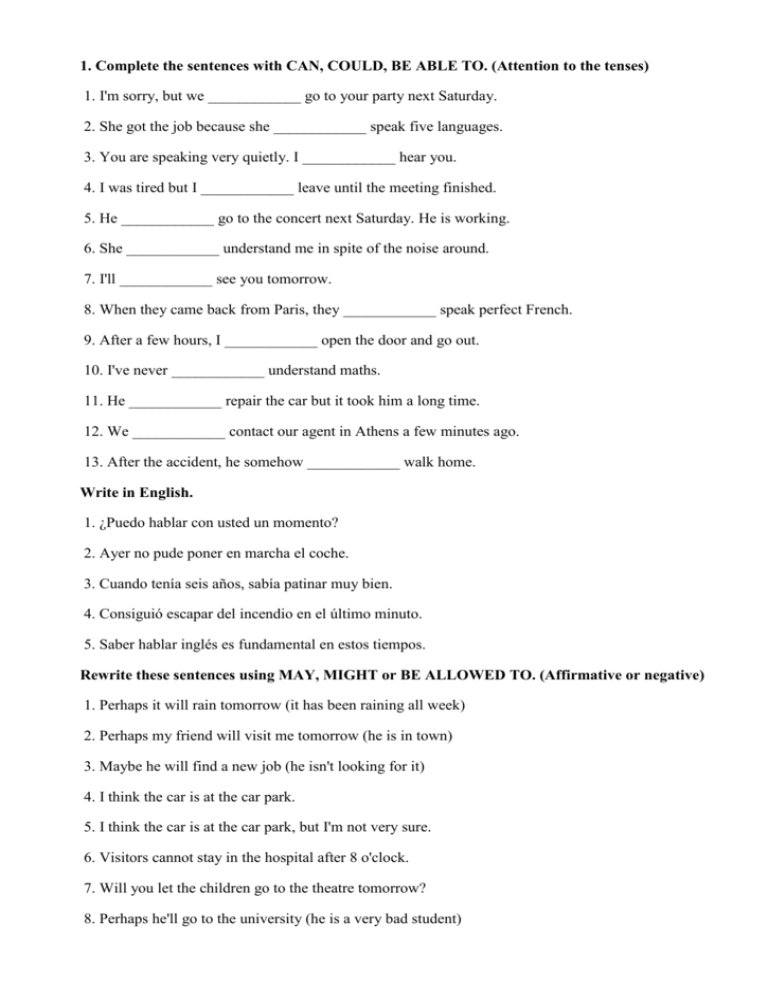
- MODAL VERBS EXERCISES ANSWERS TV
- MODAL VERBS EXERCISES ANSWERS FREE
The army succeeded in defeating their enemy.Do you think she’ll manage to get a visa?.In more formal English we can also use succeed in + -ing form.

To emphasize the difficulty or to suggest a great effort (in the present, past or future) we use manage to. ✓ This book can be used by complete beginners. X This book is able to be used by complete beginners. Note: We cannot usually use be able to with a passive.
Despite being a handicap, he is able to drive a car. If the present ability is surprising or involves overcoming some difficulty, we can also use is/are able to. She can speak Spanish but she can’t speak Italian. We use can to describe ability and cannot or can’t to describe a lack of ability in the present. This unit looks at the modals we use to describe ability and possibility, to make deductions, arrangements, suggestions, and offers, and to ask for and give permission. 
Modal verbs can be confusing for learners because individual modal forms can be used to express a number of different meanings.
MODAL VERBS EXERCISES ANSWERS FREE
People might not smoke on British Airways flights it’s forbidden.ĭOWNLOAD FREE EBOOKS Grammar Explanation: Modal verbs (1): Can, Could, May, Might, Be able to. You might get me some bin liners if it’s not too much trouble. I could leave work early yesterday – my boss gave me permission. I’ll be able to meet you after the lesson. Elizabeth can get better results if she paid more attention to her homework. Don’t bother replying as I may have changed address by the time you read this. Don’t get too anxious there may well be a simple explanation for it. I heard your sales results were excellent. A new car! What can she be thinking of!. MODAL VERBS EXERCISES ANSWERS TV
Watching TV soaps can become very addictive. My father could be a star in the 1980s, it’s a pity that he never really tried. I can’t have chosen better if I’d made the reservation myself! What an excellent choice of restaurant. These days she is rather slow but as a child, she could run like the wind. Surely you knew they didn’t accept traveller’s cheques at that hotel. When she was riding in the woods last week, Helen fell off her horse but luckily she could get back on and ride home. The job interview was a disaster I could only answer half the questions!. This computer is so simple that it is able to be operated by anyone. I can’t have been able to drive since I broke my arm last June. When I finish the course next year I can speak perfect French. I could be promoted last year but I preferred to stay on the shop floor. We took an exam yesterday and I couldn’t answer any of the questions. Tick (✓) the correct sentences, then find and correct the mistakes. Diagnostic Test: Modal Verbs (1): Can, Could, May, Might, Be able toįifteen of the sentences below contain mistakes with modal verbs. You must know where to use these modal verbs, in order to get a better IELTS band score in the exam. These modal verbs are mainly used for academic writing task 2. Guesses about the past/ possible but uncertain 
Something that is possible, but not certain General statements about the future from the past

Many modal verbs have more than one meaning and are followed by the simple form of the verb. Modal verbs are the helping verbs that express ideas like a possibility, impossibility, certainty, ability, seeking permission, making requests and so on.
1.3 Modal verbs: Practice Exercises with answersĪdvanced Grammar for IELTS: Modal verbs (1): Can, Could, May, Might, Be able to – Diagnose Test, Grammar Explanation & Practice. 1.2.4 Asking For And Giving /Refusing Permission. 1.2.3 Arrangements, Suggestions, Offers, Etc. 1.2.2 Possibility, Deduction And Speculation. 1.2 Grammar Explanation: Modal verbs (1): Can, Could, May, Might, Be able to. 1.1 Diagnostic Test: Modal Verbs (1): Can, Could, May, Might, Be able to. 1 Advanced Grammar for IELTS: Modal verbs (1): Can, Could, May, Might, Be able to – Diagnose Test, Grammar Explanation & Practice.








 0 kommentar(er)
0 kommentar(er)
